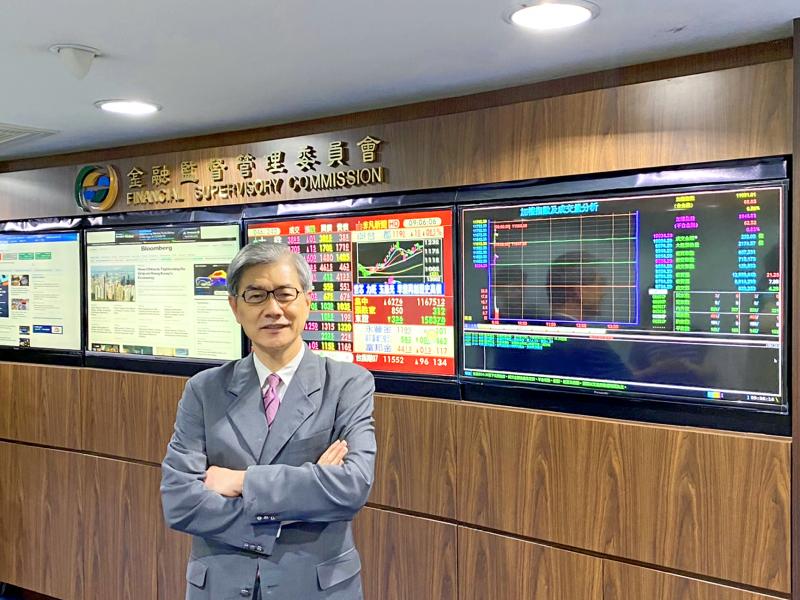The Financial Supervisory Commission (FSC) plans to introduce new policies later this year to help companies list on the local stock market, Chairman Thomas Huang (黃天牧) said in an interview yesterday.
There have only been nine IPOs so far this year, lagging far behind the commission’s target of 52 for the whole year, as the COVID-19 pandemic has affected companies’ financial performance in the first half of the year and disrupted their listing plans, Huang said.
Under current rules, companies must be profitable to qualify for listing, while those with sizable net value and large revenue, or select biotech firms recommended by the government can apply to hold IPOs.

Photo: Kao Shih-ching, Taipei Times
In view of the pandemic, the commission is considering allowing the Taiwan Stock Exchange and Taipei Exchange to use companies’ earnings results in the third quarter when reviewing their IPO qualifications, Huang said.
“We are not lowering our standards. We want to help companies mitigate the effect of the pandemic and continue their fundraising plan,” Huang said, adding that the commission would announce the new measures next month.
The commission has not trimmed its target number for IPOs, although listing activity would inevitably slow due to the pandemic, he said.
It is on schedule to implement odd-lot intraday trading in October, allowing investors to buy shares in quantities of less than 1,000 during regular trading hours, he said.
More than 60 local brokerages have expressed a willingness to handle the new service, up from 10 last year, he added.
In June next year, the Taiwan Stock Exchange is to introduce a market-making system to improve liquidity for companies that are financially sound, but not popular among investors, he added.
As for the development of open banking in Taiwan, the commission would allow banks by the end of this year to cooperate with third-party service providers to share consumer data with other banks after gaining consumers’ consent, he said.
Overall, local financial firms would remain resilient and overcome challenges due to the pandemic and global rate cuts, he said.
“I think insurers should be able to adapt to changes in the business environment, although they are sensitive to market volatility,” he said.
As local banks have been supportive in providing loans to those affected by the pandemic, the commission has seldom received complaints from companies, he said.
However, banks’ profitability might weaken slightly as they provide relief loans, he added.

GREAT SUCCESS: Republican Senator Todd Young expressed surprise at Trump’s comments and said he expects the administration to keep the program running US lawmakers who helped secure billions of dollars in subsidies for domestic semiconductor manufacturing rejected US President Donald Trump’s call to revoke the 2022 CHIPS and Science Act, signaling that any repeal effort in the US Congress would fall short. US Senate Minority Leader Chuck Schumer, who negotiated the law, on Wednesday said that Trump’s demand would fail, while a top Republican proponent, US Senator Todd Young, expressed surprise at the president’s comments and said he expects the administration to keep the program running. The CHIPS Act is “essential for America leading the world in tech, leading the world in AI [artificial

DOMESTIC SUPPLY: The probe comes as Donald Trump has called for the repeal of the US$52.7 billion CHIPS and Science Act, which the US Congress passed in 2022 The Office of the US Trade Representative is to hold a hearing tomorrow into older Chinese-made “legacy” semiconductors that could heap more US tariffs on chips from China that power everyday goods from cars to washing machines to telecoms equipment. The probe, which began during former US president Joe Biden’s tenure in December last year, aims to protect US and other semiconductor producers from China’s massive state-driven buildup of domestic chip supply. A 50 percent US tariff on Chinese semiconductors began on Jan. 1. Legacy chips use older manufacturing processes introduced more than a decade ago and are often far simpler than

Hon Hai Precision Industry Co (鴻海精密) yesterday said that its research institute has launched its first advanced artificial intelligence (AI) large language model (LLM) using traditional Chinese, with technology assistance from Nvidia Corp. Hon Hai, also known as Foxconn Technology Group (富士康科技集團), said the LLM, FoxBrain, is expected to improve its data analysis capabilities for smart manufacturing, and electric vehicle and smart city development. An LLM is a type of AI trained on vast amounts of text data and uses deep learning techniques, particularly neural networks, to process and generate language. They are essential for building and improving AI-powered servers. Nvidia provided assistance

Gasoline and diesel prices this week are to decrease NT$0.5 and NT$1 per liter respectively as international crude prices continued to fall last week, CPC Corp, Taiwan (CPC, 台灣中油) and Formosa Petrochemical Corp (台塑石化) said yesterday. Effective today, gasoline prices at CPC and Formosa stations are to decrease to NT$29.2, NT$30.7 and NT$32.7 per liter for 92, 95 and 98-octane unleaded gasoline respectively, while premium diesel is to cost NT$27.9 per liter at CPC stations and NT$27.7 at Formosa pumps, the companies said in separate statements. Global crude oil prices dropped last week after the eight OPEC+ members said they would